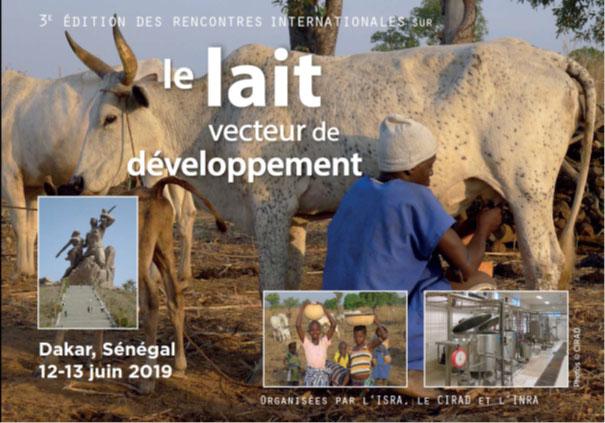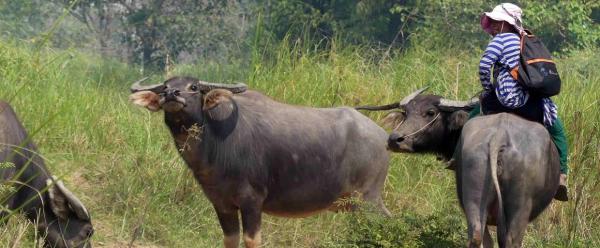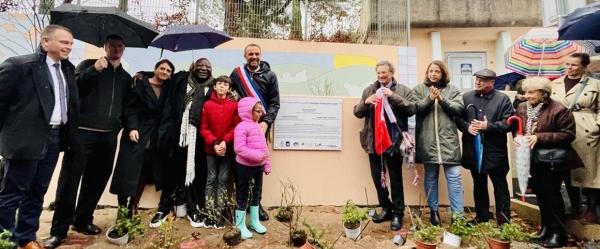- Home
- Press area
- Press releases
- Milk, driver of development 3rd edition
"Milk, driver of development": an international symposium to invent more sustainable, inclusive dairy supply chains

The third edition of the "Milk, driver of development" symposium is being held in Dakar, Senegal, on 12 and 13 June
Some 120 million farms and a billion people worldwide are involved in milk production, processing and marketing. The sector is marked by substantial diversity, in terms of production scales, races, practices, territories, cultures, the role of milk in the diet, the players involved, and national policy. How can such a patchwork and its development dynamics be addressed against a backdrop of globalization, growth in demand and the need for sustainability?
The symposium "Milk, driver of development", organized by ISRA, CIRAD and INRA in Dakar (Senegal) on 12 and 13 June, will bring together almost 200 players* from the dairy sector in 25 countries in Europe, North America and Africa, to compare their countries' experiences of this issue.
"The main ambition of this international symposium is to ensure more effective coordination of operations centring on milk and dairy products in Europe and in developing countries. In particular, the aim is to foster joint research, training or local community support projects", says CIRAD's Christian Corniaux, the event's co-organizer. "For us, milk is a driver of development. By creating jobs and generating income for families, the dairy sector can help alleviate poverty and relieve social tensions in the agro-pastoral territories of West Africa, particularly the Sahel." Several tens of millions of families produce milk in those territories.
"The fact that the symposium is being held in Dakar is not neutral", Guillaume Duteurtre, Dairy Supply Chain Correspondent at CIRAD and another co-organizer, points out. "For several months now, West African dairy producers have been working with several NGOs on a campaign to promote local milk in the face of cheap powdered milk imports" (see the joint statement on behalf of farmers and dairy producers' organizations for local and fair milk in West Africa and Europe, 10 April 2019). In particular, producers' organizations wish to support an initiative on the part of the Economic Community of West African States (ECOWAS) to launch a regional policy drive in favour of local milk (ECOWAS Milk Initiative). "The entire first day of the symposium will be devoted to the issues facing the supply chain in the ECOWAS zone. We would like to see a review of all the "levers" for boosting milk collection in pastoral areas. Sustainable development and security in the Sahel require greater integration of farmers in trade within the sub-region", Guillaume Duteurtre adds.
For its third edition, after Rennes (France, 2014) and Rabat (Morocco, 2017), the symposium will be officially opened on 12 June by the Senegalese Minister of Livestock and representatives of ISRA, the FAO and Agreenium.
It will centre on a scientific symposium and an exhibition of dairy innovations.
At the heart of the symposium's five sessions, the issue of local milk development
The symposium will offer a platform for experts, researchers and many other players from the sector: industrialists, professional organizations, NGOs and policymakers. It will include an initial thematic session on dairy development in West Africa on 12 June, followed by four others on 13 June, the last of which will address sustainable development of the local dairy chain in West Africa in the context of globalization.
1. Diverse perspectives on dairy development in West Africa
- Dairy world and place of West Africa in international trade (Vincent Chatelier, INRA, France)
- The ECOWAS Regional Milk Initiative (“Offensive Lait CEDEAO”) (Bio Goura Soule, ECOWAS, Nigeria)
- Presentation of the "Mon lait est local" Campaign (Hindatou Amadou, APESS, Burkina Faso)
- Multi-services peasant milk collection centers in Niger: the missing link to the development of local dairy value chains in West Africa (Aly Dandakoye, IRAM, Niger)
- Drivers for the ecological intensification of milk production systems in west Burkina Faso (Eric Vall, CIRAD, France)
- Development of Dairy value chain: the “Laiterie du Berger” case in Senegal (Arona Diaw, LDB, Senegal)
2. Technical and organizational issues for milk collection
- Management challenges of raw milk collection to ensure the supply of dairy products in developing countries (Mohamed Taher Sraïri, IAV Hassan II, Rabat, Morocco)
- Private and public costs & benefits and lessons learned from a Quality Based Milk Payment pilot in Kenya (Asaah Ndambi, Wageningen University, Netherlands)
- Piloting a Quality Based Milk Payment System (QBMPS) in Kenya (Gerard Oosterwijk, Happy Cow, Kenya)
- The success story of a quality based milk payment system in Mbarara, Uganda (Annabelle Daburon, Wageningen University, Netherlands)
- Social networks in the local dairy value chain in the peanut basin (Walter Ossebi, EISMV, Senegal)
- The West Africa milk innovation platforms: strengths and weaknesses (Cécile Broutin, GRET, France)
3. Diversity of dairy products, techniques, usages and markets
- Globalization and the world-wise diversity of milk products: Are we losing our tradition? (Guillaume Duteurtre, CIRAD, France)
- Camel cheese: a technical and cultural revolution? (Gaukhar Konuspayeva, Kazakhstan)
- Characterization of fermented cow milk in Senegal (B. Musabyemariya, EISMV, Senegal)
- Characterization and conservation of bacterial diversity of a breton traditional fermented milk (Gwell) linked to local cow breed (Bretonne Pie Noir) (Florence Valence, INRA, Rennes, France)
- Where is Malian milk? Processing and marketing of dairy products in Bamako, Mali (Jennifer Provost, Georg-August University Goettingen, Germany)
- Study of consumption and distribution of dairy products in Mali, Niger and Senegal (Marie-Christine Goudiaby, GRET, Dakar, Senegal)
4. Women and vulnerable actors place in the transformation of production systems and dairy value chains
- Reducing gender gaps in the dairy sector through gender-sensitive business services (Alejandra Safa Barraza, FAO, Rome, Italy)
- Socio-economic impact of the dairy processing on pastoral households in Burkina Faso: gender approach (René Milligo, PASMEP, Burkina Faso)
- The commodification of camel milk and 'suburbanization' of camel livestock: what development model (Bernard Faye, CIRAD, France)
5. Sustainable development of the local dairy chain in the context of globalization
- Milky Way to Development: Creating Market-driven Sustainable Growth in the Dairy Value Chain – Nigeria Proof of Concept (Amadou Bocoum, Arla, Denmark)
- Grameen Credit Agricole Foundation: 10 years of actions for inclusive finance, social entrepreneurship and strengthen of agricultural local value chains (Jonathan Michaud, Crédit Agricole Franche-Comté, Kossam SDE)
- The multinational dairy companies in West Africa: hope or disappointment for breeders? (Christian Corniaux, CIRAD, Senegal)
- Fat filled dairy powder: new step in the dairy products trade between the EU and West Africa (François Graas, SOS Faim, Brussels, Belgium)
- Trade and tax policies and Milk value-chains in West Africa (Laurent Levard, GRET, France)
An exhibition on "Dairy innovations": technical and organizational solutions to support local milk collection and processing
To foster exchanges between experts and field players, and the dissemination of innovations between countries, there will be an exhibition alongside the scientific symposium, dedicated to technical and organizational solutions to support local milk collection, since many dairy firms face difficulties collecting local milk in West Africa. Collection equipment will be on show, including churns, solar tanks, refrigerated tanks, tricycles fitted with tanks, and Lactoscans. Organizational experiments will also be presented, such as organizing producers within cooperatives, the establishment of interprofessional groups, credit and training programmes in support of farmers and mini-dairies, and the introduction of quality-based payment systems. Other innovations in terms of solutions for improving outlets for local milk will be discussed: cheese and fermented milk production methods, quality packaging, etc.
* Research and higher education establishments, technical institutes and professional organizations, NGOs, associations, foundations, microcredit organizations, firms, policymakers and development experts.
Supporting players to ensure sustainable, equitable development of the dairy sectorTo support current changes in the dairy sector on a global level, CIRAD is working with its partners to promote agro-ecological milk production systems and to understand and recognize: |



























